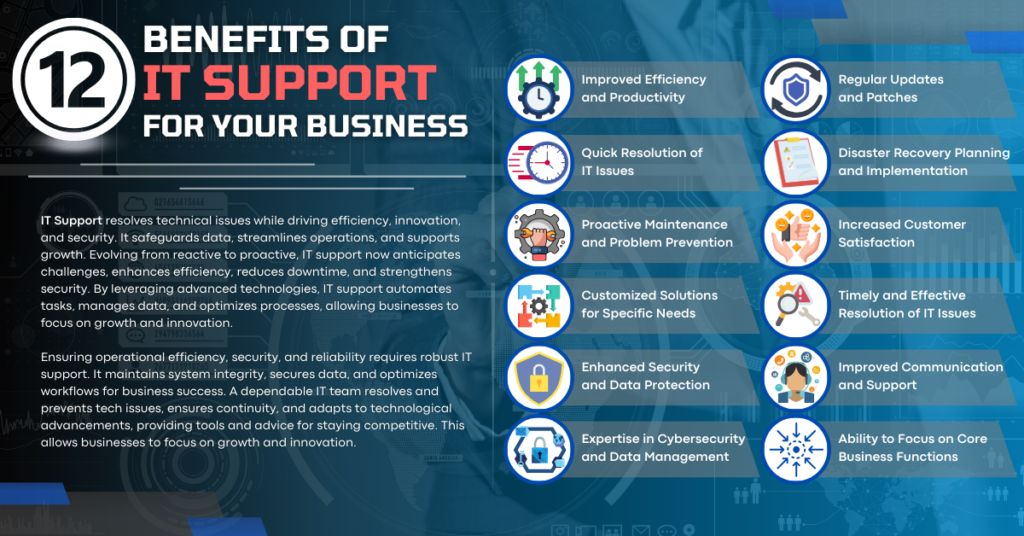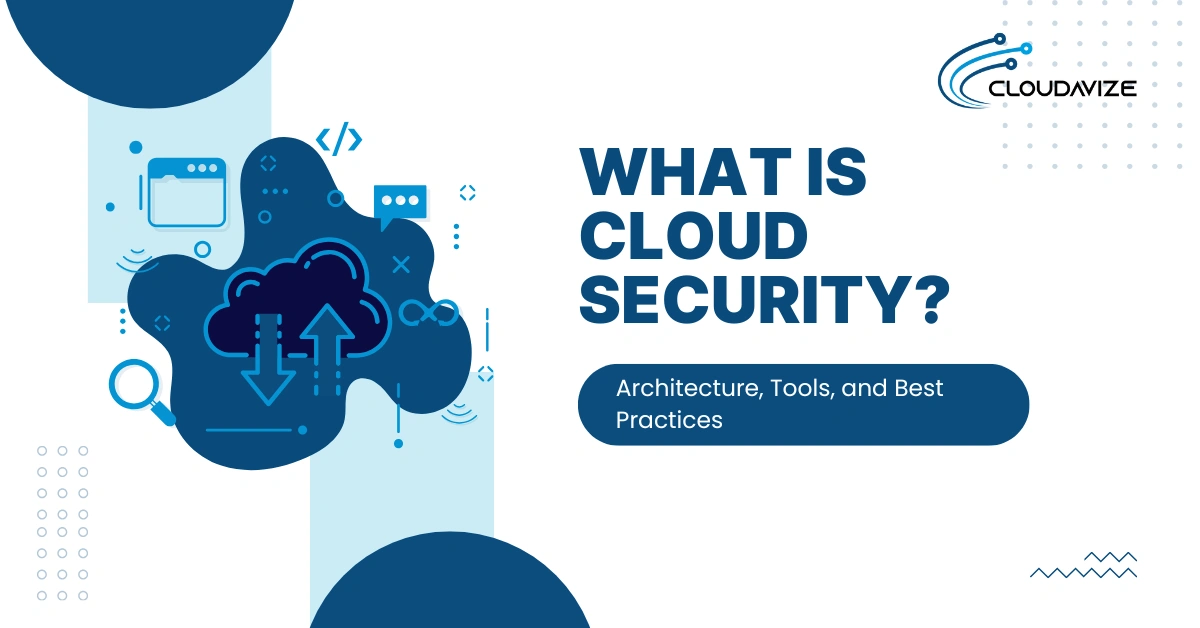Imagine a law firm losing access to case files just before a big court hearing. Without IT support, recovering those files could take hours and damage the firm’s reputation. IT support is not just about fixing computers—it helps keep your business running by protecting data and improving how your team works. In a world where every minute counts, strong IT support ensures your business stays secure, efficient, and ready for anything.
The role of IT support has evolved from reactive troubleshooting to proactive planning, transforming from a mere back-office function to an integral part of business strategy. This shift helps prevent disruptions before they occur, minimizes downtime, and strengthens cybersecurity. As a result, businesses can operate more efficiently and respond swiftly to evolving market demands.
Through automation, advanced analytics, and real-time system monitoring, IT support enhances productivity and reduces manual workload. It allows teams to concentrate on value-driven tasks by streamlining operations, securing critical data, and facilitating seamless collaboration. In the sections ahead, we’ll explore 12 key benefits of IT support and their contribution to smoother workflows, stronger protection, and sustained business growth.
Table of Contents
Why Do Your Businesses Need IT Support?
Your business needs IT support to ensure operational efficiency, data security, and adaptability to emerging technological changes. As information technology increasingly dictates most parts of business operations, IT support becomes an integral component for securing systems, minimizing downtime, and ensuring business continuity.
A reliable IT support team is not only quick to resolve technical issues but also works proactively to prevent potential problems before they occur. Keeping pace with the evolving tech industry, IT support provides businesses with the necessary tools and advice to stay ahead of the competition. This level of support is essential for businesses to leverage technology effectively, allowing their in-house department to focus on growth while experts handle the technical demands.
Here are the 12 benefits of IT support for your business:
- Improved Efficiency and Productivity
- Quick Resolution of IT Issues
- Proactive Maintenance and Problem Prevention
- Customized Solutions for Specific Needs
- Enhanced Security and Data Protection
- Expertise in Cybersecurity and Data Management
- Regular Updates and Patches
- Disaster Recovery Planning and Implementation
- Increased Customer Satisfaction
- Timely and Effective Resolution of IT Issues
- Improved Communication and Support
- Ability to Focus on Core Business Functions

1. Improved Efficiency and Productivity
Effective IT support increases efficiency and productivity by streamlining business processes, automating routine tasks such as software updates, data backups, system monitoring, and user access management, and optimizing system performance. This allows employees to focus on higher-value activities rather than getting bogged down by technical issues or repetitive tasks, significantly boosting overall business efficiency.
IT support implements advanced technologies such as cloud computing and automated data backups that enhance operational capabilities. These technologies not only speed up processes but also provide better data management and accessibility. With IT systems running optimally, businesses experience fewer downtimes and disruptions, leading to a more productive work environment that can respond quickly to market demands and opportunities.
2. Quick Resolution of IT Issues
IT support ensures fast resolution of technical problems to prevent downtime and keep operations running smoothly. It excels in quickly addressing and resolving hardware and software problems, which is crucial for businesses that rely heavily on technology to serve their customers and manage daily operations. According to MetricNet’s benchmarking database, the global average first-level resolution for IT support is 74%. This ability to rapidly diagnose and fix issues minimizes the impact on productivity and helps maintain consistent service delivery.
To support this efficiency, advanced monitoring tools and dedicated support professionals play a key role in detecting potential issues before they escalate into major disruptions. This proactive approach not only accelerates the resolution process but also strengthens overall system reliability. With a robust IT support system in place, businesses can confidently manage technical challenges, maintain operational continuity, and stay focused on their core activities and long-term goals.
3. Proactive Maintenance and Problem Prevention
Proactive maintenance and problem prevention are crucial for maintaining the health of your business’s IT infrastructure, ensuring that potential issues are addressed before they escalate into costly disruptions. By regularly updating systems, conducting risk assessments, and performing health checks, IT support helps businesses avoid the downtime and financial losses associated with unexpected technical failures.
This approach not only safeguards against data loss and security breaches but also optimizes system performance, leading to more reliable and efficient operations. Regular audits and updates mean your technology stays current and less vulnerable to the latest threats, while system optimizations ensure that your operational capacity keeps pace with business demands. Through these strategic actions, IT support provides a stable foundation for business growth and continuity.
4. Customized Solutions for Specific Needs
Tailored IT solutions address the unique challenges and goals of your business for better alignment and performance. By understanding your specific business environment and requirements, IT support can develop tailored plans that optimize both technology use and business processes.
Tailored strategies involve developing specific technology setups that integrate seamlessly with existing systems, addressing unique industry compliance requirements, or scaling solutions to match business size and scope. According to Unicom Corp, 79% of customers prefer personalized customer service over other things. With these personalized services, businesses experience improved functionality, efficiency, and competitive advantage, demonstrating how bespoke IT support is not just a service but a critical component of modern business strategy.
5. Enhanced Security and Data Protection
IT support strengthens your security posture by implementing advanced tools to guard against cyber threats. It implements robust security measures such as firewalls, anti-virus software, and encryption techniques to protect against unauthorized access and potential security vulnerabilities.
These security strategies are complemented by regular training sessions for employees on the latest cybersecurity practices, helping to prevent security breaches from within. Regular updates and patches are also applied to fortify defenses against external threats, ensuring that your business’s data protection measures are always up to date. Through these comprehensive security protocols, IT support not only protects valuable data but also builds trust with customers and stakeholders by demonstrating a commitment to security and compliance.
6. Expertise in Cybersecurity and Data Management
Specialized IT support provides expert guidance to manage data securely and defend against evolving threats. By employing IT professionals who specialize in these areas, companies ensure that their networks, systems, and data are shielded against the increasing variety of cyber threats, ranging from data breaches to ransomware attacks.
IT support teams implement robust security measures like firewalls, anti-virus software, and encryption protocols to defend against unauthorized access and data leaks. They provide regular training to keep employees aware of the latest security practices and potential phishing scams. Comprehensive data management strategies help structure, store, and access data efficiently, strengthening security and boosting operational efficiency. This allows businesses to focus on growth while maintaining high data integrity and security standards.
7. Regular Updates and Patches
Timely software updates and patches are essential for businesses to keep their systems secure, stable, and performing at their best. By keeping systems up to date, IT support minimizes vulnerabilities that could be exploited by cyberattacks and ensures that all features and functionalities are performing as intended.
Ensuring systems receive the latest updates not only enhances security but also improves performance, which can lead to better user experiences and increased productivity. Patches often include enhancements that streamline operations and introduce new features that can provide businesses with a competitive edge.
8. Disaster Recovery Planning and Implementation
Comprehensive disaster recovery planning ensures your business can recover quickly from unexpected disruptions, including data breaches, system failures, or natural disasters. This strategic approach prepares businesses to handle crises with minimal downtime, safeguarding both data integrity and business continuity.
Effective disaster recovery strategies involve developing customized recovery plans that suit specific business needs and leveraging cutting-edge technology to automate and secure backup processes. Regular drills and updates to these plans ensure businesses are always prepared for the unexpected, enabling them to maintain operations under various scenarios. Such preparedness not only protects against data loss but also reinforces customer trust by showcasing a commitment to reliability and security.
9. Increased Customer Satisfaction
Reliable IT systems improve customer experiences by enabling fast responses and consistent service delivery. Effective IT support ensures that customer-facing systems are reliable and efficient, minimizing downtime and improving the overall user experience. This reliability translates into faster response times to customer inquiries and smoother interactions, which significantly enhance customer satisfaction.
Efficient IT systems managed by a skilled support team also enable businesses to provide services and resolutions at a much faster rate. Customers appreciate quick and effective solutions to their problems, which boosts their confidence in the company. It can be backed by the Salesforce research indicating an 89% of returning customers after a positive customer service experience. Additionally, by maintaining seamless communication channels, businesses ensure that they are always reachable and responsive, further enhancing customer trust and satisfaction.
10. Timely and Effective Resolution of IT Issues
Prompt issue resolution reduces downtime and safeguards business continuity. Emplifi states that 52% of customers demand answers to their queries within an hour, reflecting the necessity of quick and timely resolution of IT issues. IT support provides businesses with a dedicated tech team to quickly address and resolve technical problems, ensuring that everything runs smoothly without significant disruptions.
This rapid response capability allows businesses to boost their customer service department, crucial for customer satisfaction and trust. Efficient problem resolution keeps systems running optimally, reducing the risk of prolonged outages that can affect business outcomes and reputation. By restoring services quickly, IT support helps preserve the integrity of business operations and supports sustained business growth.
11. Improved Communication and Support
Strong IT support enables smooth communication within the organization and with customers through reliable digital tools. By establishing and managing robust communication systems such as VoIP, email servers, and collaborative platforms, managed IT support ensures seamless information flow across all levels of the organization, crucial for effective decision-making and continuous operational flow.
These systems enhance internal teamwork and improve customer interactions, leading to quicker resolutions and higher satisfaction. According to Zendesk, more than 70% of customers expect conversational service every time they engage with a brand, underscoring the need for consistent, real-time communication channels. IT support specialists help employees learn new systems and troubleshoot any issues, ensuring that every team member can fully utilize these technologies. Such comprehensive support keeps your business connected at all times, driving better outcomes and fostering a responsive, customer-focused environment.
12. Ability to Focus on Core Business Functions
Outsourcing IT support enables businesses to concentrate on their primary objectives without the distraction of complex IT issues. This strategic allocation of resources means that managers and staff can commit their full time to delivering the highest quality products and services, fostering innovation, and enhancing sustainable growth.
By delegating technical responsibilities to IT support services, companies streamline their operations and reduce the burden on internal staff. This enhances productivity while allowing a more efficient use of resources. Employees focus on what they do best, leading to faster turnaround times and better outcomes, which in turn drive business growth and competitive advantage.
Conclusion
Effective IT support is vital for businesses aiming for sustained growth, operational efficiency, and robust security. By proactively addressing technology challenges, IT support teams enable companies to operate smoothly, respond swiftly to customer needs, and focus fully on their core business objectives. Investing in reliable IT services not only protects your business from unexpected disruptions but also positions it for sustainable growth and competitive advantage.
Ultimately, effective IT support serves as a strategic partner, empowering businesses to confidently navigate technological advancements and capitalize on emerging opportunities. Prioritizing IT support today prepares your business for success tomorrow, fostering a resilient infrastructure that adapts seamlessly to future demands.



